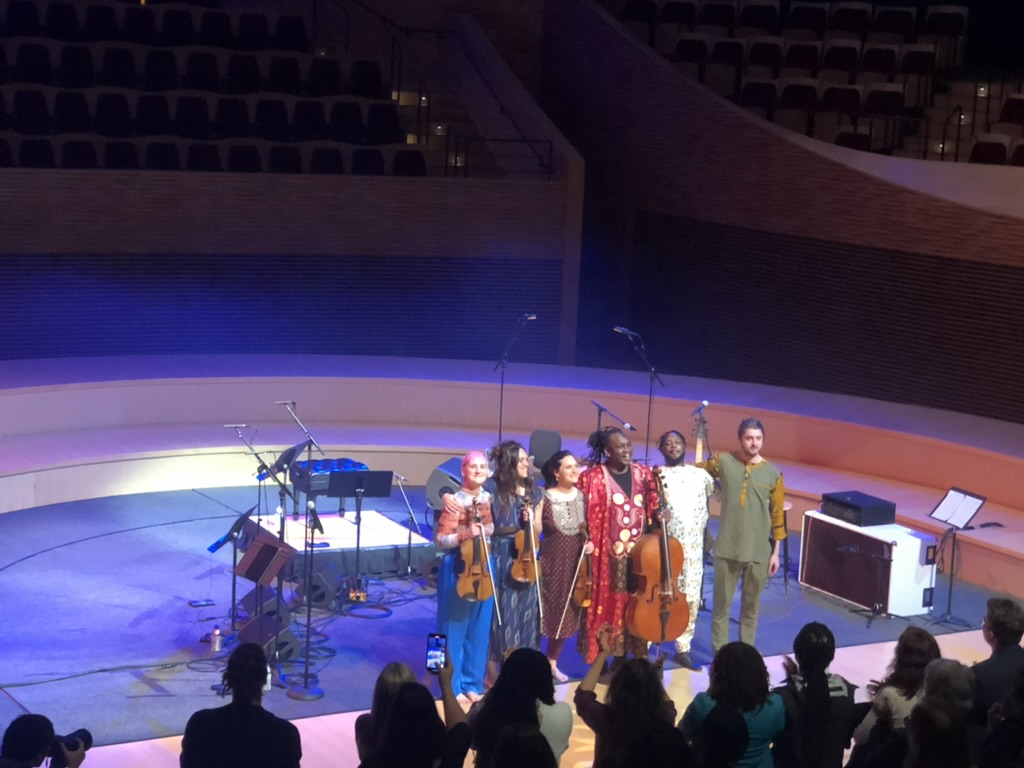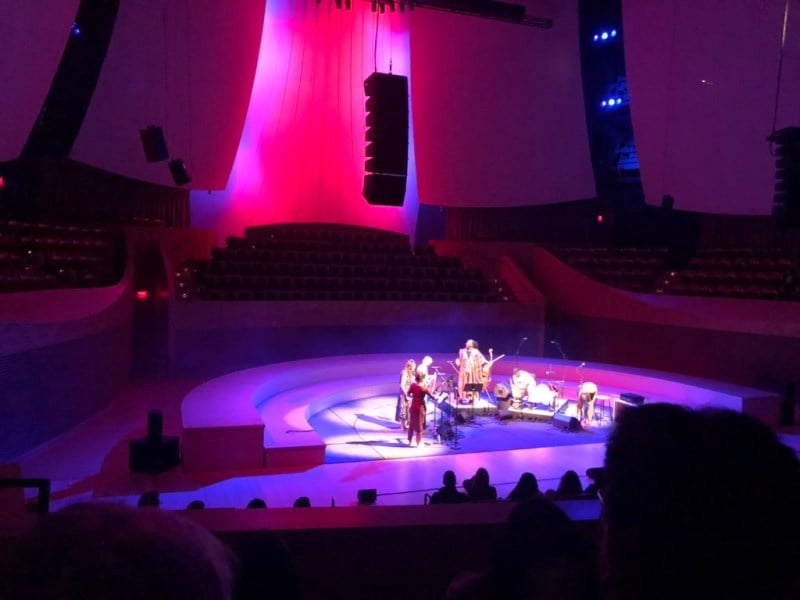Editor’s Note: This article is a review and includes subjective opinions, thoughts and critiques.
Mysterious fog, exotic percussion instruments and a really large bass amp greeted audiences during a performance by the Manchester Collective and musician Abel Selaocoe on Saturday. The ensemble presented a joyful program entitled “Sirocco,” in reference to the wind that blows between Africa and Europe.
The program explored music from a remarkable variety of cultures, reflecting the intercontinental path of the Sirocco wind. Each piece drew from the cultural roots of the performers themselves, which included violinists Rakhi and Simmy Singh from Wales and India, percussionist Sidiki Dembele from Côte d’Ivoire, violist Ruth Gibson and bassist Alan Keary from Ireland as well as vocalist and cellist Abel Selaocoe from South Africa.
The performers created a mysterious and beautiful atmosphere in “Lamentatio,” composed by cellist Giovanni Sollima. Soft, murmuring string voices, subtle hints of the bass, an ever-present percussive beat and Selaocoe’s reverberant voice made the exposition to the piece a foggy and enigmatic soundscape.
Selaocoe’s remarkable singing technique in this piece was reminiscent of Mongolian throat singing, where the vocalist manipulates their vocal resonances to amplify overtones (music notes part of the harmonic series of the fundamental frequency). It felt profound, as if plucking some fundamental string in my soul.
The ensemble’s versatility became evident as the piece transitioned to a fast, rhythmic and complex groove. The liveliness built up as the piece progressed and each instrument joined in to contribute its own energy, culminating in an explosive finale.
The second piece was perhaps one of the greatest embodiments of the idea of “Sirocco” in the concert, mimicking the lightness of wind. The song started with an improvised and conversation-like section featuring Selaocoe, Dembele on percussion and Keary on the bass.
The ensemble then transitioned into a string quartet arrangement of a movement from the opera “The Fairy Queen,” by Baroque English composer Henry Purcell. The group’s diverse musical expression and harmony were on full display, providing a beautiful rendition that demonstrated a delightfully unexpected mastery of classical music.
Finally, the piece leapt into a Swedish Polska, with Keary and Dembele joining in to provide a rhythm to the dance.
Selaocoe and the Manchester Collective smoothly blended seemingly disparate styles throughout the whole performance — a skill highlighted during this song. Everything flowed so naturally: it was almost like the ensemble’s arrangement of various styles, from Swedish dances to African folk music to the classical canon, was meant-to-be.
Each of the pieces in the concert had their own life and soundscape that the ensemble masterfully crafted.
For instance, the penultimate piece in the first half began with Selaocoe’s tender vocals in the Sesotho language alongside a light cello pizzicato (string plucking), like waves on a beach. Then the lush strings entered, cradled by a soft groove from percussion and bass, and created a gentle and beautiful environment. Its lively, middle section exuded joy and positivity, culminating with a goosebump-inducing acapella from all members of the ensemble.
The concert continued its stunning train of music, with an energetic Scandinavian dance transforming into a violin solo reminiscent of Django Reinhardt’s swing feeling to round out the first half of the program. The audience was welcomed back into the second half with a nostalgic folk tune that transitioned into a rhythmic conclusion fading away into a barely-audible drone.
Dembele led the next piece, which was a Takamba, a musical composition and dance from Mali. He introduced his instruments — the Calabash and Djembe — the second of which he has played since the age of five. After an explosive solo, Dembele led the audience in rhythmic clapping, which the rest of the ensemble joined in a mysterious, gypsy-like dance.
There was so much more incredible work from the ensemble, such as a movement from a Haydn string quartet that turned into a tender African chorale in four part harmony. A remorseful “aww” sprung from the audience when Selaocoe announced the last piece in the program, to which he responded, “We don’t want to go either!”
The official concert program concluded with an energetic, folk-like dance, with a Sesotho title that translates to “I love them so much and I don’t even know why.” Its fun, fiery ending was met with an immediate standing ovation, with some of the loudest applause I’ve ever heard in a concert hall setting.
The group eventually returned to the stage, performing an astounding encore of “Ka Bohaleng” (“On the Sharp Side”). Selaocoe explained that the piece was dedicated to mothers around the world, comparing the challenge of motherhood to “holding a knife on the sharp side.”

The group bowed after their encore performance of “Ka Bohaleng.” Their program was met with great enjoyment and appreciation from the audience. (Photo: ERIC WANG/The Stanford Daily)
The piece’s explosive cello chords transitioned into pizzicato with chant-like words in an unrelenting yet ever-changing rhythm, bringing the audience back to their feet. In fact, Selaocoe jumped up in the performance, urging audience members to sing and dance with him as he whirled around on stage — even while holding a cello.
I was truly touched by this incredibly soulful performance that was, indubitably, one of the best I’ve ever seen. It presented musical expression in its purest form, with infectiously ecstatic energy that resonated throughout the concert hall. The performance took beautiful music from so many different cultures and treated it with the care needed to create a cohesive, unforgettable show.
